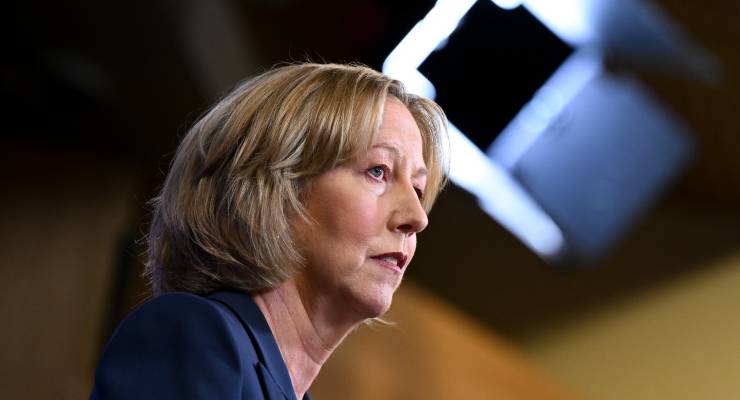
Woodside Energy CEO Meg O’Neill has been accused of “playing people for fools” and peddling “misleading nonsense” about the fossil fuel giant’s role in climate action and its removal of sacred Burrup Hub rock sites.
O’Neill, who could bank as much as $12.5 million this year in her role, according to a shareholder notice, took the opportunity at the National Press Club last Wednesday to criticise what she called a “vocal minority” with “deep pockets” who she claimed wanted to shut down the industry.
O’Neill called for more investment in the gas industry in Australia, saying gas enables the critical mineral industry, as well as feedstock, petrol-powered vehicles, toothbrushes, fertilisers and even EVs and bikes which “contain plastics that are derived from oil and gas”.
“If we don’t support investment in new gas supply and infrastructure in Australia, then we’re not only limiting the availability of gas as an energy supply, but potentially compromising the scale and pace of our renewable ambition,” she warned.
Climate Council senior researcher Dr Carl Tidemann said there was no gas supply issue in Australia, adding its industry sends “just under 73% of gas overseas” and consumes another 7% in doing so, according to Australian Energy Statistics.
“Suggesting we need more gas to protect Australians is completely false,” Tidemann told Crikey. “Yes, some gas generation is likely to be needed in the transition but this should eventually be replaced by biogases or hydrogen.
“Expanding gas extraction is just an expansion of gas industry profits, which are bolstered by the very high export-linked prices we pay, which skyrocketed based on war profiteering.”
Gas is not the new black — experts
O’Neill claimed there were 200 scenarios for what the world’s energy mix may look like in 2050 in keeping with limiting global heating to 1.5C, and said “in some of those cases, gas demand actually grows versus where it is today, versus where it is in 2020, so gas is absolutely going to be part of the mix”.
It’s a sentiment echoed by Resources Minister Madeleine King who told Parliament in March that Australia’s coal and gas resources were “essential” for energy security here and “across the Asia-Pacific”.
But head of advocacy and strategy for Greenpeace Australia Pacific Glenn Walker said O’Neill should never have been given a national platform to “peddle” what he called “misleading nonsense” without any right of reply from an environmental expert.
Gas was once regarded as a valuable transition fuel in the early days of the climate action movement because it emits half as much carbon dioxide as coal, uses similar infrastructure as coal plants, and gas-fired stations take only a couple of years to build.
But with the climate tipping point deadline fast approaching, coupled with the volatility of gas prices after Russia invaded Ukraine, many experts regard gas as a moot point. Analysis from climate think tank TransitionZero found the cost of switching from coal directly to renewable energy with no gas in between has plunged by 99% since 2010.
“Woodside’s claims that increasing gas use and production are compatible with keeping dangerous global heating below 1.5 degrees are deeply misleading and false,” Walker said, pointing to requests from the International Energy Agency to cease opening fossil fuel projects.
Walker said O’Neill’s claim relied on “cherry-picked data” from a 2018 report, which assumed extraordinarily high amounts of carbon capture and storage — some “220 times above what the world currently successfully captures and stores”, he said.
“Woodside is at odds with the science and at odds with the most credible modelling, despite the smoke and mirrors bullshit,” he said.
Tidemann agreed, calling carbon capture and storage (CCS) “nothing more than a smokescreen for fossil fuel companies to continue to operate business as usual with the future promise that they will get to net zero when CCS matures”.
‘Like destroying part of the Vatican’
O’Neill went on to describe Woodside’s support for the Voice to Parliament and briefly mentioned the “journey” the company was on with First Nations peoples, admitting “we haven’t always gotten it right”.
“When we built the Karratha gas plant, which was our first investment there, we did move rock art and we did in a way that was culturally sensitive at the time, but in the light of hindsight, it’s not something we would repeat,” she said.
In light of this, Woodside should “rip up its reconciliation action plan and stop playing our communities and people for fools”, the Greens spokesperson for resources and First Nations, Yamatji-Noongar woman Senator Dorinda Cox, said.
“In the year of the Voice, you cannot call the destruction of a sacred site ‘culturally appropriate’ when the Traditional Owners have shared time and time again their lack of consent and absolute distress at the destruction of their sacred country,” she said.
“Murujuga is a sacred site, it contains songlines, dreaming stories, and lore. The petroglyphs are a visual bible for First Nations people. If a company removed parts of the pyramids or the Vatican, there would be an international scandal.”
The Burrup Peninsula in Western Australia — known as Murujuga to traditional custodians — contains the largest and oldest collection of Indigenous rock art in the world and has been nominated for a UNESCO world heritage listing.
But critics say the sacred songlines and stories contained in these carvings are being damaged by emissions from the Burrup Hub and may face total destruction within decades, with projections of up to 4.3 billion tonnes of carbon to be released in the next 50 years.
The campaign to stop the controversial hub, which encompasses the development of the Scarborough and Browse gas fields and the expansion of two gas fields in the state’s north-west, has culminated in a high-stakes lawsuit against the government’s decision to extend the life of its North West Shelf project until 2070.
In a statement, Save our Songlines spokesperson and Mardudhunera woman Raelene Cooper said O’Neill referring to the destruction of sacred rock art as “culturally appropriate … beggars belief and is deeply offensive”, adding Woodside was responsible for “the destruction of thousands of sacred rock art sites” over the decades.
Woodside was contacted for comment.








Excellent expose Emma. Woodside is the epitome of the worst of the worst in the fossil fuel industry. It has manipulated both State and Federal government’s into approval to operate until 2070 [if there still is a market]. If there isn’t, then they will probanly declare bankrupcy and walk away. If they are forced to close down from local and international pressure, then they will likely persue damages.
Between now and 20-70 they have not laid out any plans for emissions reductions neither are they required to. They can buy carbon offsets and promise to use CCS and other unviable and un-proven technologies. Th.ere is not even a committment to wind or solar power in their energy mix. No steps to stop flaring asap. No controls over air pollution and emissions that can damage the world’s oldest and largest rock art site next door, let alone the effect of emissions on workers and people living nearby.
Who knows when it will end whilst governments are in the pockets of these non-human corporations.
An appalling company with an appalling record and garbage talk for the future – what a press club event
Too kind.
Don’t you love the gas industry? Making a fortune from overseas profits, increasing the price all the time, arguing that only the opening of more gas fields will lower the price, and then claiming that a switch to electricity will just make gas more essential and more expensive. No chutzpah here at all.
You forget the massive hypocrisy in criticising the “deep pockets” of those who campaign against the gas industry. Poor little gas industry CEOs, standing up to the wealthy Goliaths of the environmental movement.
Using gas instead of renewables just results in more global heating.
And unless fugitive emissions of natural gas during production, transport and use are less than 3.2%, using natural gas will result in more global heating than using coal (because natural gas, methane, is a much more powerful greenhouse gas than CO2). The range is between 1 and 9%, so using natural gas rather than coal results in slightly less global heating or much more.
Awee bit confused here. I was under the impression that methane is up to 80 x more effective than CO2 at heat trapping. This is why methane reduction, trapping, and sequestration is so important. Flaring off methane is industrially stupid. There are techologies than can convert methane into methanol which is a very useful hydrogen donor for fuel cells. Methane can also be used to generate electricity leaving residual CO2 and H2O. If that methane stock was derived from the current leakage by the fuel fossil profiteers it would mitigate the impact. Moreover, if that methane was derived from renewables (biomass, landfill, compost, sewage etc.) it would be carbon neutral.
Her address sums up why I am unconcerned about AI. Fake, self-serving waffle like this has been around since the age of the beaker people.
Good article. Just wanted to correct the notion that gas has half the C02 of coal. If we’re talking about just burning both fuels this true but when methane leaked in gas production and pipelines is factored in then gas doesn’t come off too well.
At a methane leakage rate of 3-4%, gas has the same climate impact as coal. I couldn’t find information from Australia and both Labor and Liberal have refused to sign the recent global pledge to reduce methane emissions. Leakage rates of up to 17% have been found in the US using satellite technology with 5-10% being common:
https://www.lockthegate.org.au/methane_leakage_and_venting
I’m very sceptical that gas production and consumption in Australia is lower in C02 than coal until we can independently see what the methane emissions of gas actually are.